Case Study: Human Capital Asset Recognition in Financial Reporting
VerifiedAdded on 2022/10/11
|6
|1345
|12
Case Study
AI Summary
This case study presents a pre-recorded interview with a student discussing the recognition of human capital as an asset. The student defines an asset and explains why human capital, encompassing skills, knowledge, and expertise, should be considered one. The discussion covers the value of human capital in knowledge-based economies, its impact on organizational profit, and the importance of employee competencies. The student acknowledges counterarguments, such as valuation challenges and the subjective nature of human capital, which can be affected by employee mobility and emotional factors. The interview concludes with the student reflecting on how their perspective changed after considering the arguments and correspondence from peers, ultimately supporting the idea that human skills should be recognized as an asset, similar to tangible assets, despite the inherent uncertainties.
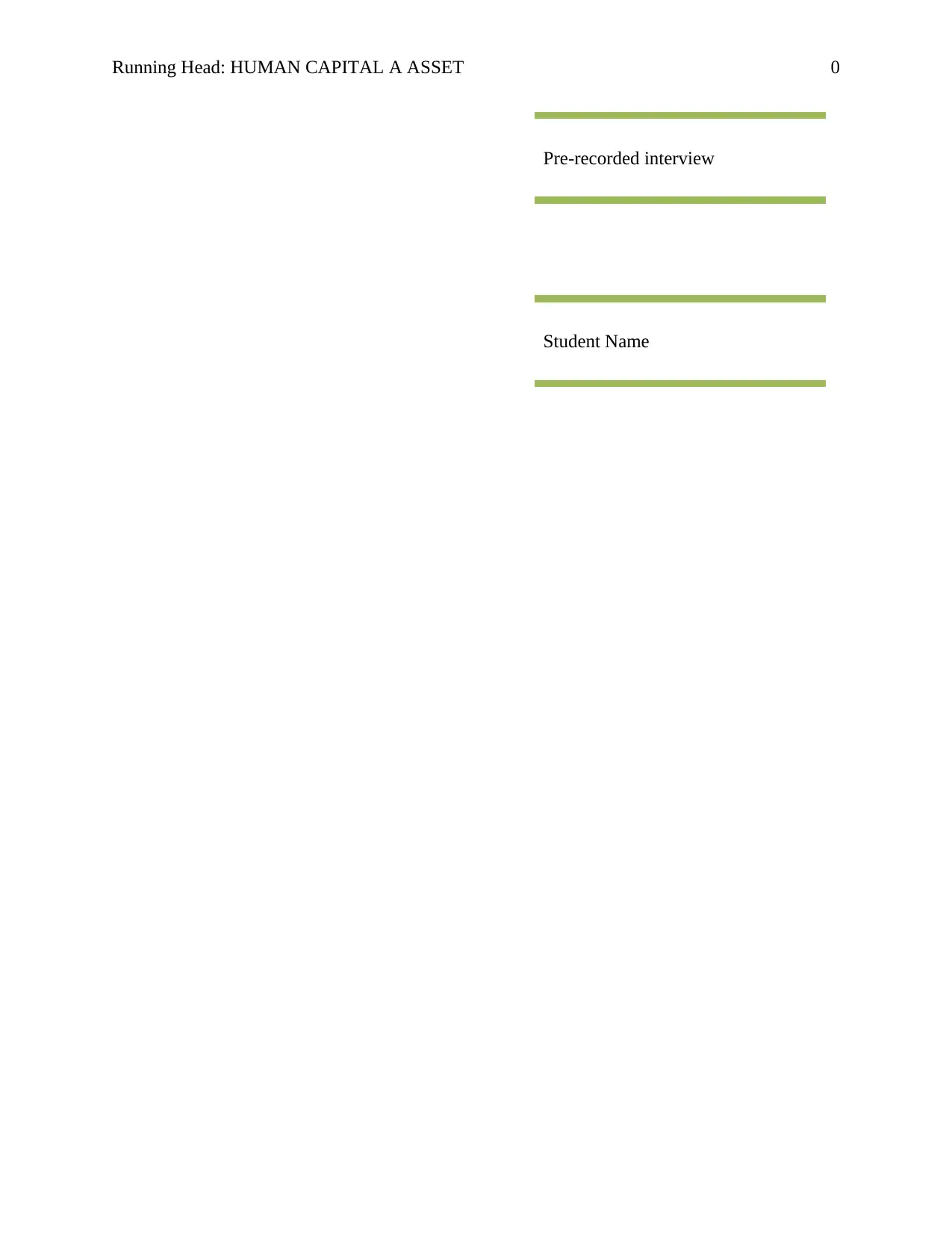
Running Head: HUMAN CAPITAL A ASSET 0
Pre-recorded interview
Student Name
Pre-recorded interview
Student Name
Paraphrase This Document
Need a fresh take? Get an instant paraphrase of this document with our AI Paraphraser
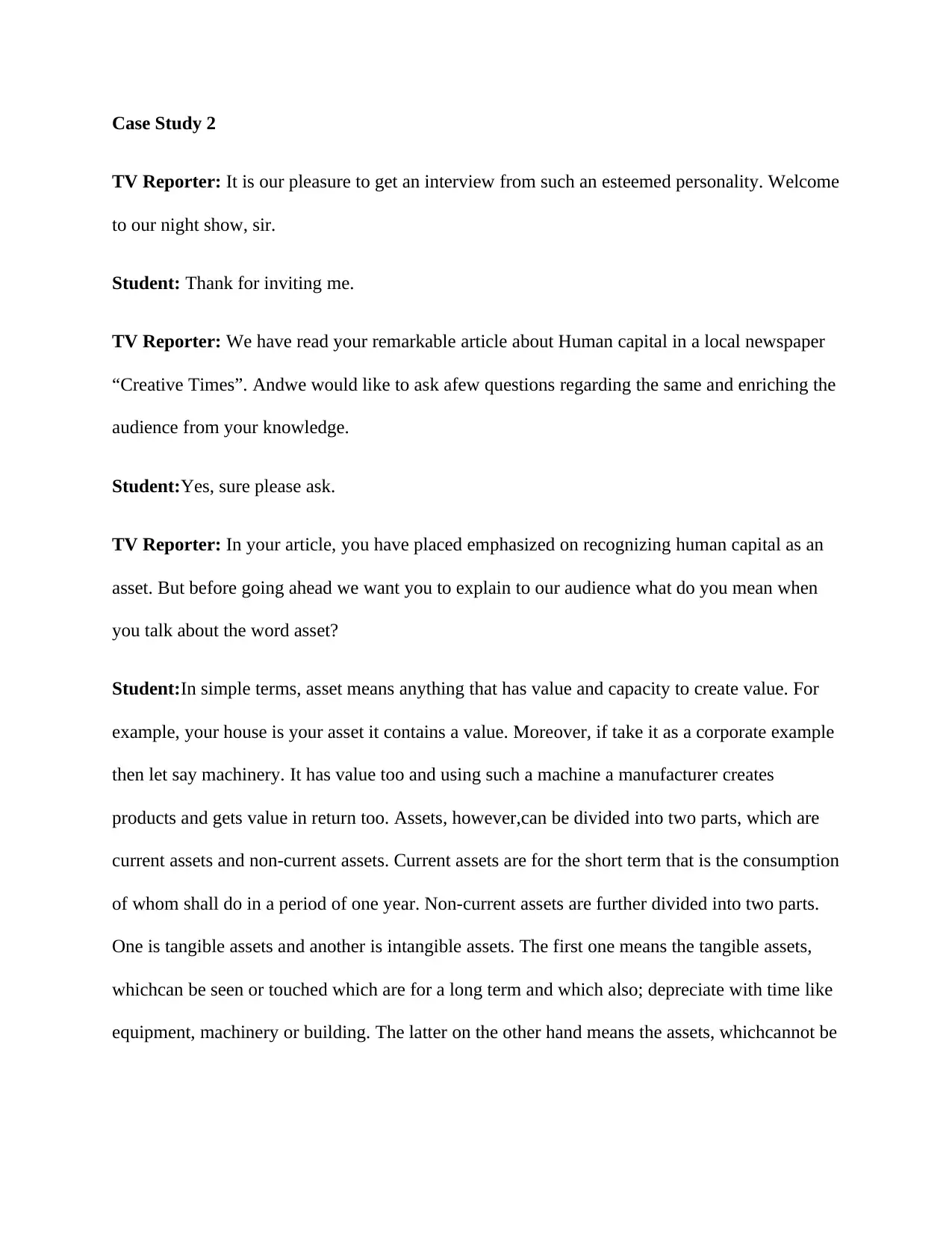
Case Study 2
TV Reporter: It is our pleasure to get an interview from such an esteemed personality. Welcome
to our night show, sir.
Student: Thank for inviting me.
TV Reporter: We have read your remarkable article about Human capital in a local newspaper
“Creative Times”. Andwe would like to ask afew questions regarding the same and enriching the
audience from your knowledge.
Student:Yes, sure please ask.
TV Reporter: In your article, you have placed emphasized on recognizing human capital as an
asset. But before going ahead we want you to explain to our audience what do you mean when
you talk about the word asset?
Student:In simple terms, asset means anything that has value and capacity to create value. For
example, your house is your asset it contains a value. Moreover, if take it as a corporate example
then let say machinery. It has value too and using such a machine a manufacturer creates
products and gets value in return too. Assets, however,can be divided into two parts, which are
current assets and non-current assets. Current assets are for the short term that is the consumption
of whom shall do in a period of one year. Non-current assets are further divided into two parts.
One is tangible assets and another is intangible assets. The first one means the tangible assets,
whichcan be seen or touched which are for a long term and which also; depreciate with time like
equipment, machinery or building. The latter on the other hand means the assets, whichcannot be
TV Reporter: It is our pleasure to get an interview from such an esteemed personality. Welcome
to our night show, sir.
Student: Thank for inviting me.
TV Reporter: We have read your remarkable article about Human capital in a local newspaper
“Creative Times”. Andwe would like to ask afew questions regarding the same and enriching the
audience from your knowledge.
Student:Yes, sure please ask.
TV Reporter: In your article, you have placed emphasized on recognizing human capital as an
asset. But before going ahead we want you to explain to our audience what do you mean when
you talk about the word asset?
Student:In simple terms, asset means anything that has value and capacity to create value. For
example, your house is your asset it contains a value. Moreover, if take it as a corporate example
then let say machinery. It has value too and using such a machine a manufacturer creates
products and gets value in return too. Assets, however,can be divided into two parts, which are
current assets and non-current assets. Current assets are for the short term that is the consumption
of whom shall do in a period of one year. Non-current assets are further divided into two parts.
One is tangible assets and another is intangible assets. The first one means the tangible assets,
whichcan be seen or touched which are for a long term and which also; depreciate with time like
equipment, machinery or building. The latter on the other hand means the assets, whichcannot be
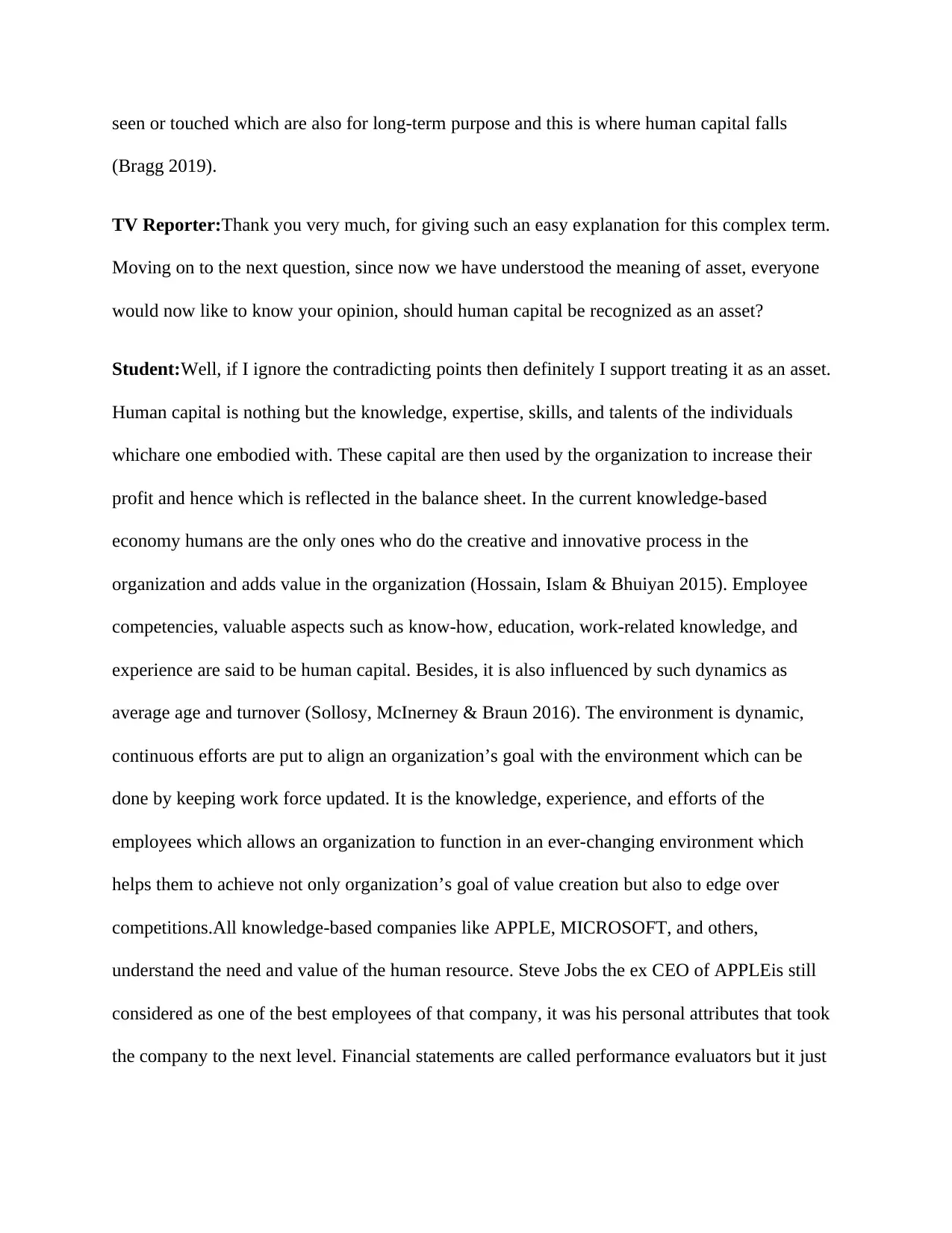
seen or touched which are also for long-term purpose and this is where human capital falls
(Bragg 2019).
TV Reporter:Thank you very much, for giving such an easy explanation for this complex term.
Moving on to the next question, since now we have understood the meaning of asset, everyone
would now like to know your opinion, should human capital be recognized as an asset?
Student:Well, if I ignore the contradicting points then definitely I support treating it as an asset.
Human capital is nothing but the knowledge, expertise, skills, and talents of the individuals
whichare one embodied with. These capital are then used by the organization to increase their
profit and hence which is reflected in the balance sheet. In the current knowledge-based
economy humans are the only ones who do the creative and innovative process in the
organization and adds value in the organization (Hossain, Islam & Bhuiyan 2015). Employee
competencies, valuable aspects such as know-how, education, work-related knowledge, and
experience are said to be human capital. Besides, it is also influenced by such dynamics as
average age and turnover (Sollosy, McInerney & Braun 2016). The environment is dynamic,
continuous efforts are put to align an organization’s goal with the environment which can be
done by keeping work force updated. It is the knowledge, experience, and efforts of the
employees which allows an organization to function in an ever-changing environment which
helps them to achieve not only organization’s goal of value creation but also to edge over
competitions.All knowledge-based companies like APPLE, MICROSOFT, and others,
understand the need and value of the human resource. Steve Jobs the ex CEO of APPLEis still
considered as one of the best employees of that company, it was his personal attributes that took
the company to the next level. Financial statements are called performance evaluators but it just
(Bragg 2019).
TV Reporter:Thank you very much, for giving such an easy explanation for this complex term.
Moving on to the next question, since now we have understood the meaning of asset, everyone
would now like to know your opinion, should human capital be recognized as an asset?
Student:Well, if I ignore the contradicting points then definitely I support treating it as an asset.
Human capital is nothing but the knowledge, expertise, skills, and talents of the individuals
whichare one embodied with. These capital are then used by the organization to increase their
profit and hence which is reflected in the balance sheet. In the current knowledge-based
economy humans are the only ones who do the creative and innovative process in the
organization and adds value in the organization (Hossain, Islam & Bhuiyan 2015). Employee
competencies, valuable aspects such as know-how, education, work-related knowledge, and
experience are said to be human capital. Besides, it is also influenced by such dynamics as
average age and turnover (Sollosy, McInerney & Braun 2016). The environment is dynamic,
continuous efforts are put to align an organization’s goal with the environment which can be
done by keeping work force updated. It is the knowledge, experience, and efforts of the
employees which allows an organization to function in an ever-changing environment which
helps them to achieve not only organization’s goal of value creation but also to edge over
competitions.All knowledge-based companies like APPLE, MICROSOFT, and others,
understand the need and value of the human resource. Steve Jobs the ex CEO of APPLEis still
considered as one of the best employees of that company, it was his personal attributes that took
the company to the next level. Financial statements are called performance evaluators but it just
⊘ This is a preview!⊘
Do you want full access?
Subscribe today to unlock all pages.

Trusted by 1+ million students worldwide
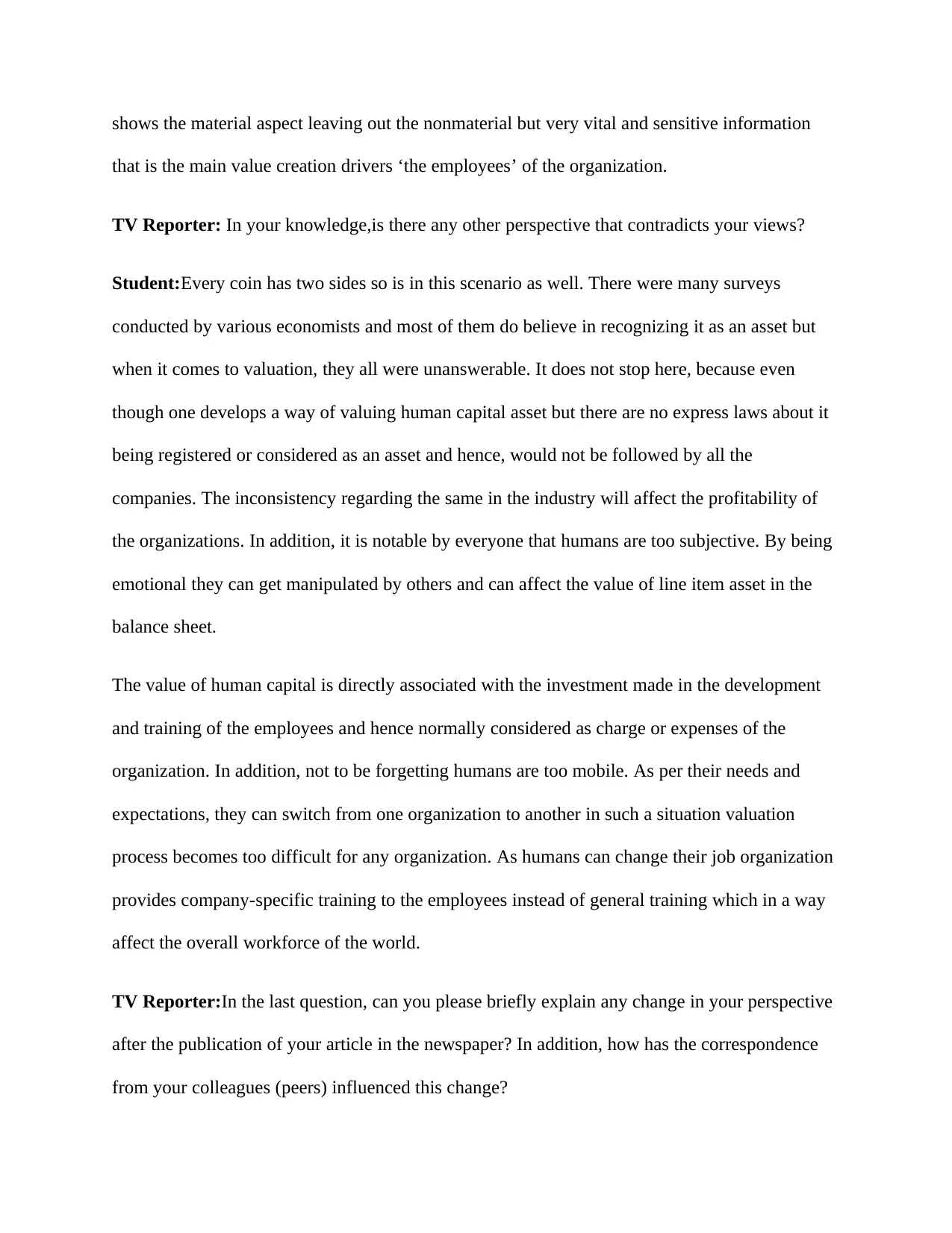
shows the material aspect leaving out the nonmaterial but very vital and sensitive information
that is the main value creation drivers ‘the employees’ of the organization.
TV Reporter: In your knowledge,is there any other perspective that contradicts your views?
Student:Every coin has two sides so is in this scenario as well. There were many surveys
conducted by various economists and most of them do believe in recognizing it as an asset but
when it comes to valuation, they all were unanswerable. It does not stop here, because even
though one develops a way of valuing human capital asset but there are no express laws about it
being registered or considered as an asset and hence, would not be followed by all the
companies. The inconsistency regarding the same in the industry will affect the profitability of
the organizations. In addition, it is notable by everyone that humans are too subjective. By being
emotional they can get manipulated by others and can affect the value of line item asset in the
balance sheet.
The value of human capital is directly associated with the investment made in the development
and training of the employees and hence normally considered as charge or expenses of the
organization. In addition, not to be forgetting humans are too mobile. As per their needs and
expectations, they can switch from one organization to another in such a situation valuation
process becomes too difficult for any organization. As humans can change their job organization
provides company-specific training to the employees instead of general training which in a way
affect the overall workforce of the world.
TV Reporter:In the last question, can you please briefly explain any change in your perspective
after the publication of your article in the newspaper? In addition, how has the correspondence
from your colleagues (peers) influenced this change?
that is the main value creation drivers ‘the employees’ of the organization.
TV Reporter: In your knowledge,is there any other perspective that contradicts your views?
Student:Every coin has two sides so is in this scenario as well. There were many surveys
conducted by various economists and most of them do believe in recognizing it as an asset but
when it comes to valuation, they all were unanswerable. It does not stop here, because even
though one develops a way of valuing human capital asset but there are no express laws about it
being registered or considered as an asset and hence, would not be followed by all the
companies. The inconsistency regarding the same in the industry will affect the profitability of
the organizations. In addition, it is notable by everyone that humans are too subjective. By being
emotional they can get manipulated by others and can affect the value of line item asset in the
balance sheet.
The value of human capital is directly associated with the investment made in the development
and training of the employees and hence normally considered as charge or expenses of the
organization. In addition, not to be forgetting humans are too mobile. As per their needs and
expectations, they can switch from one organization to another in such a situation valuation
process becomes too difficult for any organization. As humans can change their job organization
provides company-specific training to the employees instead of general training which in a way
affect the overall workforce of the world.
TV Reporter:In the last question, can you please briefly explain any change in your perspective
after the publication of your article in the newspaper? In addition, how has the correspondence
from your colleagues (peers) influenced this change?
Paraphrase This Document
Need a fresh take? Get an instant paraphrase of this document with our AI Paraphraser
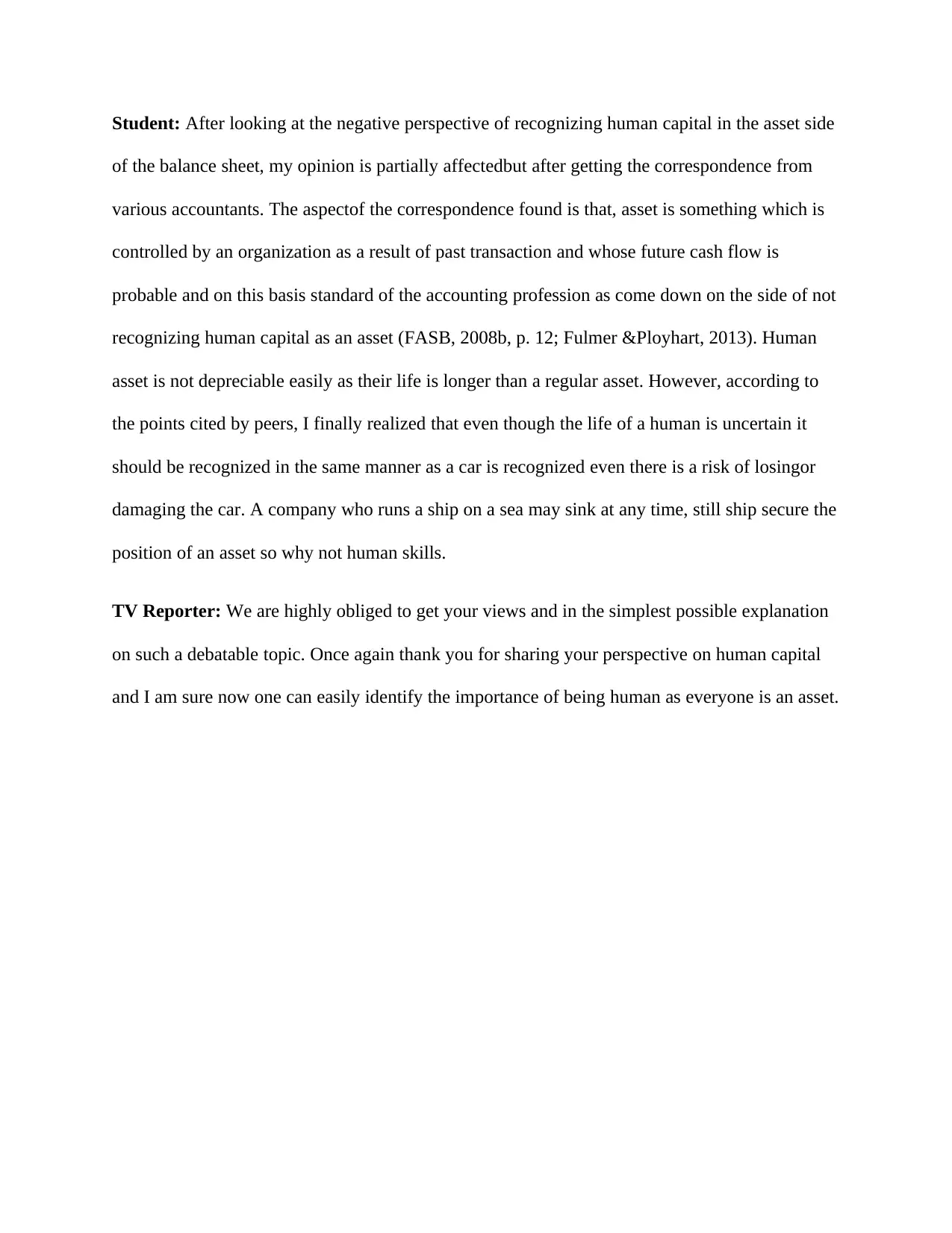
Student: After looking at the negative perspective of recognizing human capital in the asset side
of the balance sheet, my opinion is partially affectedbut after getting the correspondence from
various accountants. The aspectof the correspondence found is that, asset is something which is
controlled by an organization as a result of past transaction and whose future cash flow is
probable and on this basis standard of the accounting profession as come down on the side of not
recognizing human capital as an asset (FASB, 2008b, p. 12; Fulmer &Ployhart, 2013). Human
asset is not depreciable easily as their life is longer than a regular asset. However, according to
the points cited by peers, I finally realized that even though the life of a human is uncertain it
should be recognized in the same manner as a car is recognized even there is a risk of losingor
damaging the car. A company who runs a ship on a sea may sink at any time, still ship secure the
position of an asset so why not human skills.
TV Reporter: We are highly obliged to get your views and in the simplest possible explanation
on such a debatable topic. Once again thank you for sharing your perspective on human capital
and I am sure now one can easily identify the importance of being human as everyone is an asset.
of the balance sheet, my opinion is partially affectedbut after getting the correspondence from
various accountants. The aspectof the correspondence found is that, asset is something which is
controlled by an organization as a result of past transaction and whose future cash flow is
probable and on this basis standard of the accounting profession as come down on the side of not
recognizing human capital as an asset (FASB, 2008b, p. 12; Fulmer &Ployhart, 2013). Human
asset is not depreciable easily as their life is longer than a regular asset. However, according to
the points cited by peers, I finally realized that even though the life of a human is uncertain it
should be recognized in the same manner as a car is recognized even there is a risk of losingor
damaging the car. A company who runs a ship on a sea may sink at any time, still ship secure the
position of an asset so why not human skills.
TV Reporter: We are highly obliged to get your views and in the simplest possible explanation
on such a debatable topic. Once again thank you for sharing your perspective on human capital
and I am sure now one can easily identify the importance of being human as everyone is an asset.
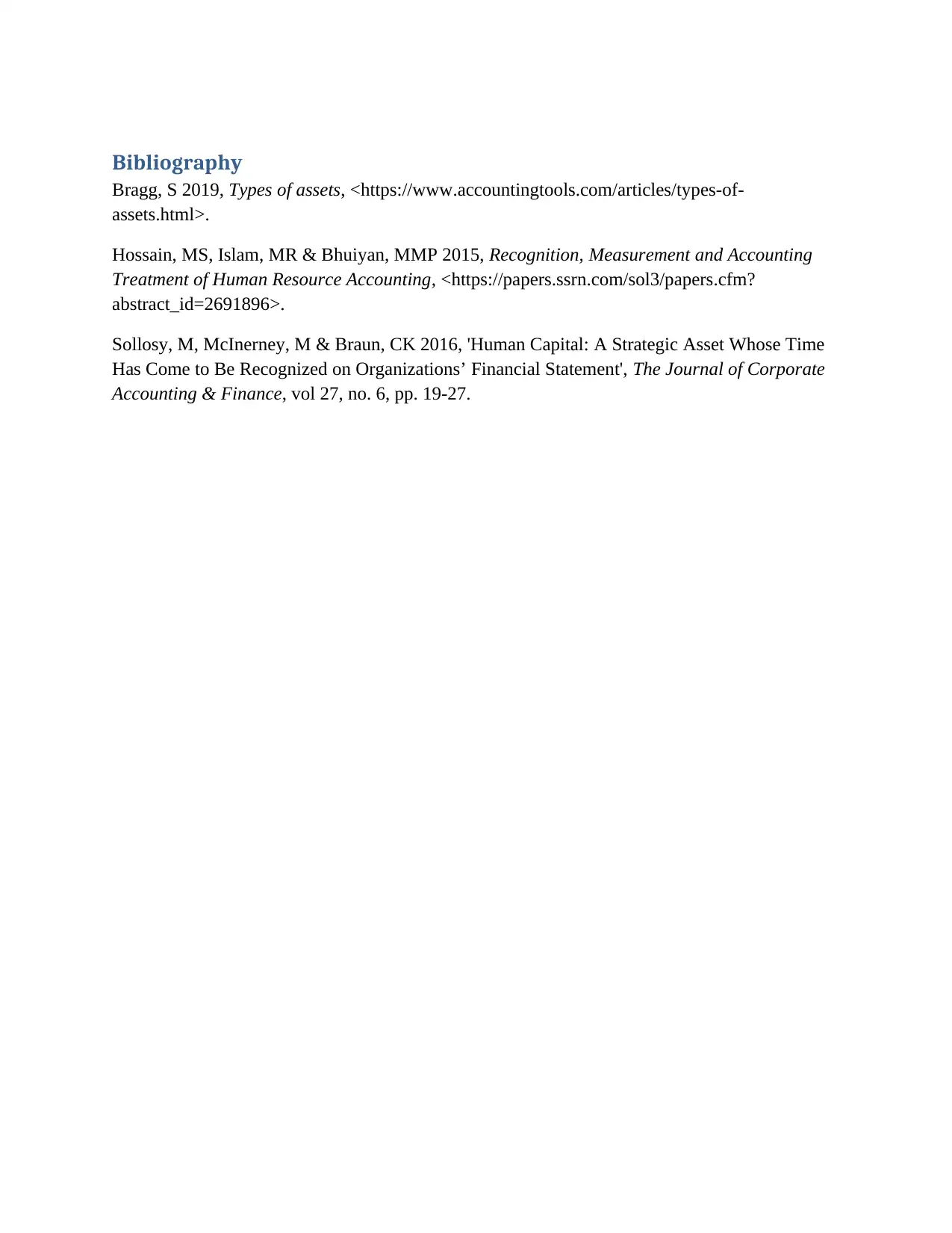
Bibliography
Bragg, S 2019, Types of assets, <https://www.accountingtools.com/articles/types-of-
assets.html>.
Hossain, MS, Islam, MR & Bhuiyan, MMP 2015, Recognition, Measurement and Accounting
Treatment of Human Resource Accounting, <https://papers.ssrn.com/sol3/papers.cfm?
abstract_id=2691896>.
Sollosy, M, McInerney, M & Braun, CK 2016, 'Human Capital: A Strategic Asset Whose Time
Has Come to Be Recognized on Organizations’ Financial Statement', The Journal of Corporate
Accounting & Finance, vol 27, no. 6, pp. 19-27.
Bragg, S 2019, Types of assets, <https://www.accountingtools.com/articles/types-of-
assets.html>.
Hossain, MS, Islam, MR & Bhuiyan, MMP 2015, Recognition, Measurement and Accounting
Treatment of Human Resource Accounting, <https://papers.ssrn.com/sol3/papers.cfm?
abstract_id=2691896>.
Sollosy, M, McInerney, M & Braun, CK 2016, 'Human Capital: A Strategic Asset Whose Time
Has Come to Be Recognized on Organizations’ Financial Statement', The Journal of Corporate
Accounting & Finance, vol 27, no. 6, pp. 19-27.
⊘ This is a preview!⊘
Do you want full access?
Subscribe today to unlock all pages.

Trusted by 1+ million students worldwide
1 out of 6
Related Documents
Your All-in-One AI-Powered Toolkit for Academic Success.
+13062052269
info@desklib.com
Available 24*7 on WhatsApp / Email
![[object Object]](/_next/static/media/star-bottom.7253800d.svg)
Unlock your academic potential
Copyright © 2020–2025 A2Z Services. All Rights Reserved. Developed and managed by ZUCOL.





